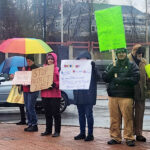To the editor:
If you think about it, caroling is an awful thing to do to people.
I loved caroling with my church when I was a kid. Over 20 people would pile into our 14-passenger van and drive around my hometown looking for plowed driveways. When we found one, our motley collection of singers and lone accordion player (my aunt Linda, who remains my favorite aunt to this day in spite of the fact that she plays the accordion) would pour out of the van and swarm the house.
Generally someone would open the door halfway through our first song and usher us inside out of the cold. We would finish out our set in someone’s living room or entry way or kitchen or (once, memorably) bathroom. Sometimes an old blue tin of cracker-textured cookies or a bowl of stale peppermints would be passed around.
Being welcomed into a stranger’s house was part of the excitement of caroling. People — especially people from a small town — keep weird things in their houses. As a kid, it was fascinating to walk into a living room and find an extensive collection of lamps rigged from old liquor bottles. Or a wall filled entirely with ancient China dolls painstakingly dressed in real clothing. Or a stuffed dog. Or farm equipment. Or an old person sleeping (hopefully) under a pile of quilts in a hospital bed right next to the recliner.
In hindsight, caroling seems like an awful thing to do to people. I get irritated when telemarketers call my house. Opening my door to find a crowd of people honking out Christmas carols in 14-part harmony to the asthmatic wheezing of an accordion would not put me in a good mood, and I definitely wouldn’t invite them to stamp into my living room and drip snot and snow all over my carpet. Frankly, if I saw someone walking up my driveway with an accordion I’d lock my door and fetch a bat. Looking back on my own caroling experiences, it’s kind of a Christmas miracle nobody ever shot at us.
And we weren’t welcome at every house. It was the only part of caroling I didn’t like: every now and then someone would open their front door and frown at us, then grudgingly beckon us in. We would bravely warble our way through four or five carols while a middle-aged couple or elderly man or a tired mother and a few kids would stare back at us, fumbling with their robe or their cane or a mug. They would watch us sullenly while we caroled as only a roving band of Pentecostals could (we firmly believed that the word “Hallelujah!” could — and should — be added into any song). Then they would bob their heads in uncertain thanks, or grudgingly mumble something along the lines of, “Nice to have you folks. Mind the dog on the way out.” And we would smile back and then make a hasty retreat for the bus, anxious to escape the tension.
I couldn’t help asking my father once why we bothered to sing at houses where we weren’t even wanted, much less welcomed. “These people don’t even go to our church, Dad,” I pointed out as the van pulled out of the driveway following yet another uncomfortable caroling episode. “Is it just me, or is it weird that every year we pile half of our church into a van to go sing Christmas carols to them? Couldn’t we just mail them a tape and call it good?”
Dad shrugged. “We’re singing about what Christmas really is,” he replied calmly, eyes on the road. He thought for a minute, choosing his words carefully. “Chris, every year people hear “Frosty the Snowman” and “Grandma Got Run Over By A Reindeer” on the radio. That’s not what Christmas is about. We might be the only time this year when people will remember it’s about Jesus. A Savior to all men, born in Bethlehem, heralded by angels.”
I thought it over while we drove to the next house. Although we had a rotating list of carols we sang, every one of them centered on the birth of Christ. “Silent Night,” “Away In A Manger,” “It Came Upon A Midnight Clear” — even when belted with gusto by an amateur choir backed by an out-of-tune guitar and an accordion, all of these songs served as reminders of the birth of Christ, our redeemer and our salvation. Sure, every now and then we’d take a request for “Jingle Bells,” but we’d throw in a couple enthusiastic “Hallelujahs!” just for the feel of the thing. Who better to be reminded of God’s gift of redemption than people who didn’t go to church? And if they wouldn’t go to church, why couldn’t our church to go them?
I have a lot of good memories of caroling, like the time we went into a man’s garage and my mother insisted on standing in front of his pin-up calendar, glowering at us as we tried to catch a glimpse of Miss December (who, I remember from reading the margins of the calendar, liked puppies and sleigh rides but did not apparently care much for clothing).
Mostly, though, I remember how happy we were. It wasn’t fake, either; the kind of happy face we throw on at church or at work or at the company Christmas party. We were all genuinely happy. If you believe (as I do) in the gift of God’s Son to us as a means to a relationship with God, it’s hard to sing about it and remain pessimistic. Even now, even as I’m assaulted with ads about Santa and elves and reindeer and talking snowmen, I’m glad there’s something to celebrate besides folk tales and new-age cartoon mythology.
The last carol our group used to sing was, “We Wish You A Merry Christmas.” It seemed like a fitting way to leave people. If I could, I’d sing it right now to everyone who reads this. But since I can’t, I leave it to you to sing it to yourselves and know that the sentiment is mine. (You can play along on an accordion if you’d like.) So from my family to you and yours, I say with great sincerity: born is the King of Israel. Merry Christmas. Hallelujah.
Chris Morton
Masardis







